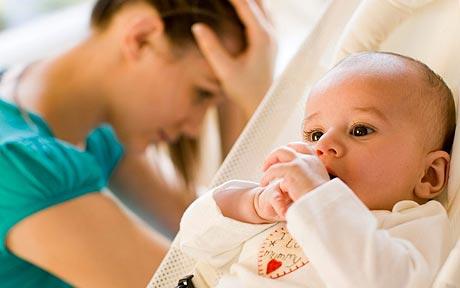
A mother's depression may affect her baby's sleep, a new study suggests.
The results show depressed mothers are more likely to needlessly wake up their infants at night than mothers who are not depressed, the researchers said.
"When depressed mothers sought out their infants at night, their infants did not appear to be in need of parental help. They were either sound asleep or perhaps awake, but not distressed," said study researcher Douglas Teti, professor of human development, psychology, and pediatrics at the Pennsylvania State University.
Depressed mothers who worry excessively about their babies' well-being at night may respond to infant sounds that don't necessarily require response, or move their babies into their own beds to alleviate their own anxieties about whether their infants are hungry, thirsty and comfortable, the researchers said. Mothers who are feeling depressed also may seek out their infants at night for their own emotional comfort, they said.
"Sleep problems often endure beyond early childhood, and can have a negative effect on various aspects of development, including emotional, behavioral, and academic functioning," Teti said. "Understanding how maternal depression and sleep problems combine to affect children's development is important to developing interventions to help reduce these negative consequences."
Teti and colleagues collected data on 45 infants, ages 1 month to 2 years old, and their parents over seven consecutive days. The mothers kept a diary of their infants' sleeping habits, and they also completed a survey to assess their depressive symptoms and worries about their infants.
On the sixth day of the study, the researchers set up video cameras around each baby's bed, and other rooms in the house where mothers took their babies during the night. The cameras captured between 10 and 12 hours of video. What the researchers observed on the videos agreed with what the parents reported.
Mothers with higher levels of depression and more worries about their children's sleep had children whose sleep was more disrupted.
Previous studies had found a link between depression in moms and disturbed sleep in babies, and some researchers had suggested that infants' who slept poorly could affect their mothers' mental health. But the new study shows that it was most likely the mothers' behavior, and not the infants, that played the larger role in the link, the researchers said.
Moms with more symptoms of depression and worries behaved in ways that disrupted their infants' sleep — for example, picking up babies who were sleeping.
If parental depression or worry disrupts both a parent's and an infant's sleep, it could have negative consequences for the parent-child relationship over the long term. In situations like these, steps might be considered to help reduce parents' distress, the researchers wrote in the April 17 issue of the journal Child Development.
Read more here
No comments:
Post a Comment